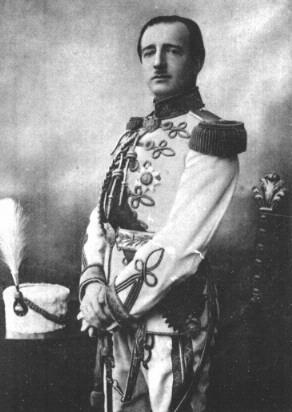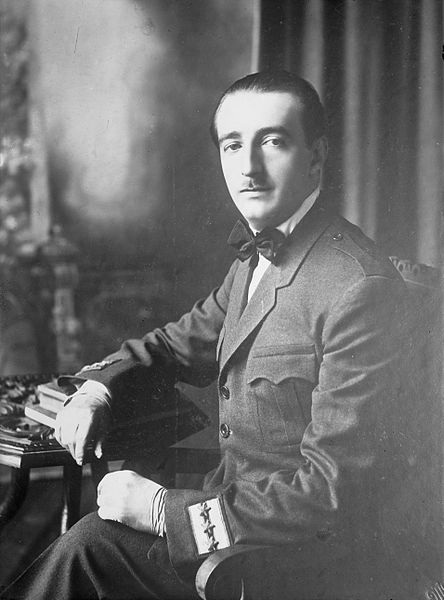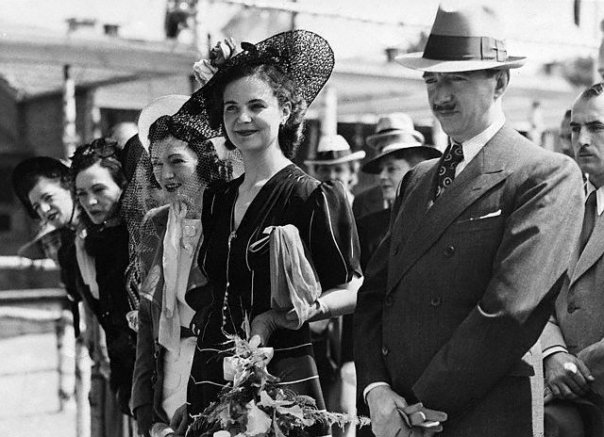<Back to Index>
- Ornithologist and Malacologist William John Swainson, 1789
- Composer Heinrich Schütz, 1585
- King of the Albanians Zog I, Skanderberg III, 1895
PAGE SPONSOR


Zog I, Skanderbeg III of the Albanians (Albanian: Zogu; 8 October 1895 – 9 April 1961), born Ahmet Muhtar Zogolli, was King of the Albanians from 1928 to 1939. He was previously Prime Minister of Albania (1922 – 1924) and President of Albania (1925 – 1928).
Zog was born Ahmet Muhtar (Ahmad Mukhtar) Bej Zogolli in Burgajet Castle, near the town of Burrel in the Ottoman Empire, second son to Xhemal Pasha Zogolli, and first son by his second wife Sadijé Toptani in 1895. His family was a beylik family of landowners, with feudal authority over the region of Mati. His mother's Toptani family claimed to be descended from the sister of Albania's greatest national hero, the 15th century general Skanderbeg.
Zogolli was educated at Lycée Impérial de Galatasaray in Constantinople, then the seat of the decaying Ottoman Empire, which technically controlled Albania. Upon his father's death in about 1908, Zogolli, became governor of Mat. He was appointed over his elder brother Xhelal Bey Zogolli. In 1912, he signed the Albanian Declaration of Independence as the representative of the Mat District.
As a young man during the First World War, Zogolli volunteered on the side of Austria - Hungary. He was detained at Vienna in 1917 and 1918 and in Rome in 1918 and 1919 before returning to Albania in 1919. During his time in Vienna, he grew to enjoy a Western European lifestyle and was rumoured to be very popular among the Viennese women.
Upon his return, Zogolli became involved in the political life of the fledgling Albanian government that had been created in the wake of the First World War. His political supporters included many southern feudal landowners (called beys, Turkish for "province chieftain", the social group to which he belonged) and noble families in the north, along with merchants, industrialists, and intellectuals. During the early 1920s, Zog served as Governor of Shkodër (1920 – 1921), Minister of the Interior (March - November 1920, 1921 – 1924), and chief of the Albanian military (1921 – 1922). His primary rivals were Luigj Gurakuqi and Fan S. Noli.
In 1922, Zogolli formally changed his surname from the turkified Zogolli to Zogu, which in the Albanian language means "bird".
It was a dangerous time to be an Albanian politician. In 1923, Zogu was shot and wounded in Parliament. A crisis arose in 1924 after the assassination of one of Zogu's industrialist opponents, Avni Rustemi; in the aftermath, a leftist revolt
forced Zogu, along with 600 of his allies, into exile in June 1924. He
returned to Albania with the backing of Yugoslav forces and Yugoslavia based White Russian troops and became Prime Minister. Zogu was officially elected as the first President of
Albania by the Constituent Assembly on 21 January 1925, taking office
on 1 February for a seven year term. Zogu's government followed the European model,
though large parts of Albania still maintained a social structure
unchanged from the days of Ottoman rule, and most villages were serf
plantations run by the Beys. On 28 June 1925, Zogu ceded Sveti Naum to Yugoslavia as a gesture of recognition to the Yugoslav aid to him. Zogu
enacted several major reforms. These included the prohibition of veils
and prohibitions against cruelty to animals. Zogu's principal ally
during this period was Italy,
which lent his government funds in exchange for a greater role in
Albania's fiscal policy. During Zogu's presidency, serfdom was
gradually eliminated. For the first time since the death of Skanderbeg,
Albania began to emerge as a nation, rather than a feudal patchwork of
local Beyliks. His administration was marred by disputes with Kosovar leaders, primarily Hasan Prishtina and Bajram Curri.
On 1 September 1928 General Zogu was crowned King of the Albanians (Mbret i Shqiptarëve in Albanian), and declared Field Marshal of the Royal Albanian Army on the same day. He proclaimed a constitutional monarchy similar to the contemporary regime in Italy,
created a strong police force, and instituted the Zogist salute (flat
hand over the heart with palm facing downwards). He claimed to be a
successor of Skanderbeg,
through descent through Skanderbeg's sister. Zog hoarded gold coins and
precious stones, which were used to back Albania's first paper currency. Zog's
mother, Sadije, was declared Queen Mother of Albania, and Zog also gave
his brother and sisters Royal status as Prince and Princesses Zogu. One
of his sisters, Senije, Princess Zogu (c 1897 – 1969), married His
Imperial Highness Prince Shehzade Mehmed Abid Efendi of Turkey, a son
of Sultan Abdul Hamid II.
Zog attempted to reinforce his regime's legitimacy further by ruling as a constitutional monarch.
His kingdom's constitution forbade any Prince of the Royal House from
serving as Prime Minister or a member of the Cabinet and contained
provisions for the potential extinction of the Royal Family.
Ironically, in light of later events, the constitution also forbade the
union of the Albanian throne with that of any other country. Under the
Zogist constitution, the King of the Albanians, like the King of the Belgians, exercised Royal powers only after taking an oath before Parliament; Zog himself swore an oath on the Bible and the Qur'an (the king being Muslim) in an attempt to unify the country. In 1929, King Zog abolished Islamic law in Albania, adopting in its place a civil code based on the Swiss one, as Ataturk's Turkey had done in the same decade. Zog's regime brought stability to Albania. The King organised an educational system and attempted to modernize the Albanian military, though the costs involved in this project were high. Although born as an aristocrat and hereditary Bey,
King Zog was somewhat ignored by other monarchs in Europe because he
had no links to the well known European royal families. Nonetheless, he
did have strong connections with Muslim royal families in the Arab World, particularly Egypt, whose ruling dynasty had Albanian origins. As King, he was honoured by the governments of Italy, Luxembourg, Egypt, Yugoslavia, France, Romania, Greece, Belgium, Bulgaria, Hungary, Poland, Czechoslovakia, and Austria. In the absence of nightclubs or theatres in Tirana, the King spent much of his time playing poker, usually with his sisters. He was also a heavy smoker, smoking about 150 cigarettes a day. Zog had been engaged to the daughter of Shefqet Bey Verlaci before he became King. Soon after his coronation, however, he broke off the engagement. According to traditional customs of blood vengeance prevalent
in Albania at the time, Verlaci had the right to kill Zog. The King
made more than a few enemies — rumour had it that he was the subject of
many blood vendettas in
addition to Verlaci's — and he frequently surrounded himself with a
personal guard and avoided public appearances. He also feared that he
might be poisoned, so the Queen Mother assumed supervision of the Royal
Kitchen. During his reign he is reputed to have survived over 55 assassination attempts. One of these occurred on 21 February 1931, whilst Zog was visiting the Vienna State Opera house for a performance of Pagliacci. The attackers struck
whilst Zog was getting into his car, and he survived by firing back
with a pistol that he always carried. This is the only occasion in
modern history when a Head of State has personally exchanged fire with potential assassins. In April 1938 Zog married Countess Geraldine Apponyi de Nagy - Apponyi, a Roman Catholic aristocrat who was half - Hungarian and half - American. Their only child, HRH Crown Prince Leka, was born in Albania on 5 April 1939. The fascist government of Benito Mussolini's
Italy had supported Zog since early in his presidency; that support had
led to increased Italian influence in Albanian affairs. The Italians
compelled Zog to refuse to renew the First Treaty of Tirana (1926), although Zog still retained British officers in the Gendarmerie as a counterbalance against the Italians, who had pressured Zog to remove them. During the worldwide depression of the early 1930s Zog's government became almost completely dependent on Mussolini, to the point that the Albanian national bank had its seat in Rome.
Grain had to be imported, many Albanians emigrated, and Italian
settlers were allowed to settle in Albania. In 1932 and 1933, Albania
was unable to pay the interest on its loans from the Society for the
Economic Development of Albania, and the Italians used this as a
pretext for further dominance. They demanded that Tirana put Italians
in charge of the Gendarmerie, join Italy in a customs union, and grant
the Italian Kingdom control of Albania's sugar, telegraph, and
electrical monopolies. Finally, Italy called for the Albanian
government to establish teaching of the Italian language in
all Albanian schools, a demand that was swiftly refused by Zog. In
defiance of Italian demands, he ordered the national budget to be
slashed by 30 percent, dismissed all Italian military advisers, and
nationalized Italian run Roman Catholic schools in the north of Albania
to decrease Italian influence on the population of Albania. In 1934, he
tried without success to build ties with France, Germany, and the
Balkan states, and Albania drifted back into the Italian orbit. Two days after the birth of his son and heir, on 7 April 1939 (Good Friday),
Mussolini's Italy invaded, facing no significant resistance. The
Albanian army was ill equipped to resist, as it was almost entirely
dominated by Italian advisors and officers and was no match for the
Italian Army. The Italians were, however, resisted by small elements in
the gendarmerie and general population. The Royal Family, realising
correctly that their lives were in danger, fled into exile. "Oh God, it
was so short" were King Zog's last words to Geraldine on Albanian soil. Count Ciano,
the Italian Foreign Minister, arrived the following day; on searching
the Palace in Tirana, he found the labour room in the Queen's suite;
seeing a pile of linen on the floor, stained by the afterbirth, he
kicked it across the room. "The cub has escaped!" he said. Mussolini declared Albania a protectorate under Italy's King Victor Emmanuel III.
While some Albanians continued to resist, "a large part of the
population ... welcomed the Italians with cheers", according to one
contemporary account.
Prior to the birth of Prince Leka, the position of Heir Presumptive was held by Prince Tati Esad Murad Kryziu,
born 24 December 1923 in Tirana, who was the son of the King's sister,
Princess Nafije. He became honorary General of the Royal Albanian Army
in 1928, at age five. He was made Heir Presumptive with the style of
His Highness and title of "Prince of Kosova" (Princ i Kosoves) in 1931. After the Royal House's exile, he moved to France, where he died in August 1993. The royal family settled in England, first at The Ritz in London, followed by a brief stay in the Sunninghill / south Ascot area in Berkshire in 1941 (near where Zog's nieces had been at school in Ascot). In 1941 they moved to Parmoor House, Parmoor, near Frieth in Buckinghamshire with some staff of the court living in locations around Lane End. In
1946, King Zog and most of his family left England and went to live in
Egypt at the behest of King Farouk, who was overthrown in 1952. The
family left for France in 1955. In 1951, Zog bought the Knollwood estate in Muttontown, New York, USA. The sixty - room estate was never occupied and Zog sold the estate in 1955. Zog finally chose to make his home in France. He died in the Hôpital Foch, Suresnes, Hauts-de-Seine on
9 April 1961 at the age of 65 after being seriously ill for some time.
He was survived by his wife and son, and is buried at the Thiais
Cemetery in Paris. On his death, his son Leka was pronounced H.M. King Leka of the Albanians by the exiled Albanian community. His widow, Queen Geraldine, died of natural causes in 2002 at the age of 87 in a military hospital in Tirana, Albania. During World War II,
there were three resistance groups operating in Albania: the
nationalists, the royalists and the communists. Some of the Albanian
establishment opted for collaboration. The partisans would not
co-operate with the other resistance groups and took control of the
country. They were able to defeat the last Nazi remnants as the war
ended, with the help of British arms and aid. Zog attempted to reclaim
his throne after the war. Sponsored by the British, some forces loyal
to Zog attempted to mount invasions but were continually ambushed due to intelligence sent to the Soviet Union by spy Kim Philby — Albania now had a Communist government led by Enver Hoxha, who remained in power for 45 years. A referendum in 1997 proposed to restore the monarchy in the person of Zog's son Leka Zogu who,
since 1961, has been styled "Leka I, King of the Albanians". The
official results stated that about two-thirds of voters favoured a
continued republican government. HM King Leka, believing the result to
be fraudulent, attempted an armed uprising: he was unsuccessful and was
forced into exile, although he later returned and now lives in Tirana. A main street in Tirana was later renamed "Boulevard Zog I" by the Albanian government.
